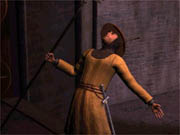The Messenger is yet another French adventure game brought to the United States by DreamCatcher Games. It has a promising premise. You play as Morgan Sinclair, an operative who must break into the Louvre and steal the Four Keys of Satan, relics that when used together can bring about the end of the world. That's not the strong part. What's interesting is that you must explore the Louvre in four different time periods to find the keys, and the chance to visit the same location at distinct moments is a unique one.

In the wake of Thief: The Dark Project, the cat burglar premise has become more common in games. The Messenger borrows less from that game than it does from Traitors Gate, another DreamCatcher game that let you explore a historic location (the Tower of London) with the intention of robbing it blind. Traitors Gate had the sort of continuity that is crucial to story-driven adventure games. Unfortunately, The Messenger lacks this continuity, and as a result the puzzles are confusing, and the protagonist comes off as a sort of confused sociopath.
Two of the first puzzles in the game require you to kill guards. The first you shoot with your high-tech crossbow. The second, who is sound asleep, you bludgeon to death with a chandelier. The violence seems not only inappropriate but also illogical. Hasn't Morgan Sinclair read any science fiction? Won't the modern bolt stuck in the medieval guard's head cause any repercussions? And if you're going to send someone back in time, why make it someone who's going to resort to murdering a sleeping man just because he might hear her take a jug of water? The confusion continues when you meet the next guard. For some reason, you can't just shoot this guy, even though his back is exposed to you and he's four feet away. Instead, you must find a way to scare him. The solution doesn't make much sense--even less so because of the previous encounters.
The puzzles in The Messenger don't always veer this far into left field, though there are some that require you to combine strange items in equally strange ways. The rest of the puzzles are easily solved using the high-tech equipment you have at your disposal. You have a diamond knife, the aforementioned crossbow, a flashlight, and a gas mask. These things are all left for you in the basement of the Louvre in 1377, but you can hold only so many items in your inventory at once. This is either a means of making the game more challenging or extending its length. It doesn't work as the former and works only slightly as the latter, if only because you can navigate to any previously visited location via the map. It can't be a question of making the game more realistic because there are multiple chests throughout the castle that hold your extended inventory no matter where you originally dropped it, much like the storage chests in the Resident Evil games. As a result, the limits on your inventory serve no purpose other than to aggravate you.
The Messenger uses an engine and interface just like in Traitors Gate. You move around from point to point, and at each location you have the freedom to look around in 360 degrees. The cursor changes to show what you can interact with, and there are only a few locations where hotspot hunting is necessary. The engine doesn't lend itself to high-quality visuals, so the detailed interiors of the Louvre are mostly just muddy and pixelated. However, the game's cinematics are crisp and detailed, and you'll have a few opportunities to examine artifacts close up.

Yet what's most disappointing about The Messenger is how it misses the opportunity to take advantage of a great premise. In each time period, you'll only visit a few rooms of the Louvre. The game never tries to make the surroundings seem real and familiar, so jumping from one period to the next doesn't seem that interesting. There are some mildly interesting plot points regarding the Black Templars' search for the four keys, but unfortunately the story isn't very involving overall.
There are two types of adventure games. There are those in which the puzzles and story are fully integrated with the game, and one lends itself to the other. And there are those that are primarily a series of puzzles, in which the story, if there even is one, is an afterthought. The Messenger is an average example of the second type, desperately trying to pass itself off as the first.